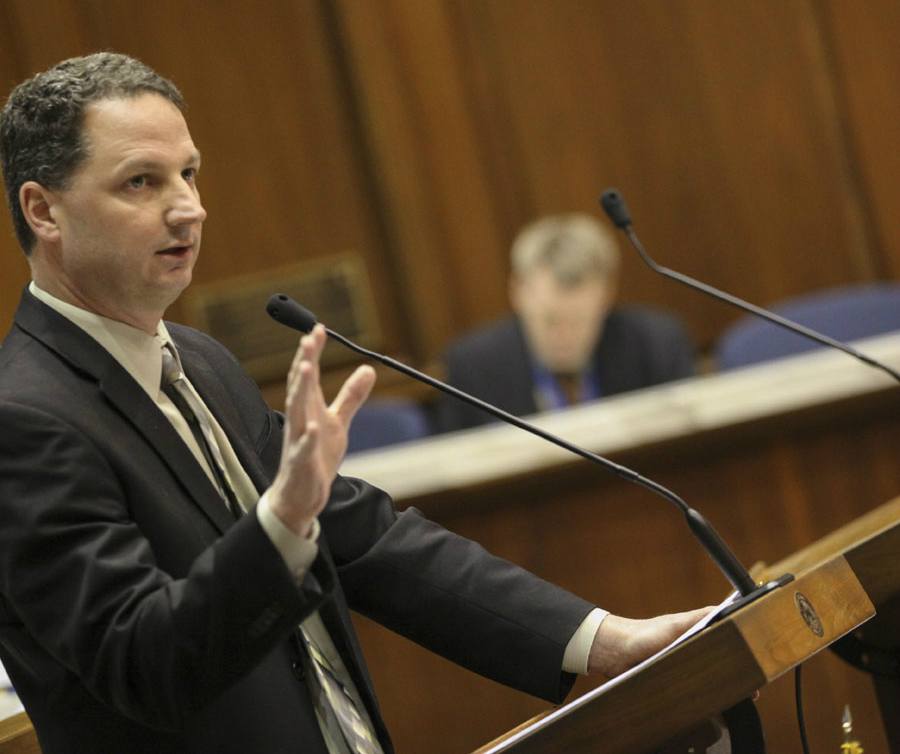Indiana Casinos Rejoice over New Law Kicking Admissions Tax to Curb
Posted on: May 17, 2017, 03:00h.
Last updated on: May 17, 2017, 02:15h.
Indiana casinos are praising state lawmakers for changing the way the state taxes their riverboats.

House Bill 1350, introduced in January by State Rep. Todd Huston (R-Hamilton County), eliminates a longstanding $3 admissions tax that casinos have been forced to pay for each patron that steps onto their gambling floor. In its place, HB 1350 debuts a supplemental wagering tariff that will be dependent on revenue, not occupancy.
After much outcry from the majority of the state’s 10 casinos, Huston’s legislation garnered widespread bipartisan support. Republican Gov. Eric Holcomb signed the statute into law this month.
“A very positive step for Indiana’s gaming industry,” Boyd Gaming spokesman David Stow told the Chicago Tribune recently. Nevada-based Boyd Gaming owns and operates the Blue Chip Casino in Michigan City, Indiana.
“It will provide our industry with stability from a tax perspective, and it will encourage additional re-investment in Indiana,” Stow concluded.
Indiana’s three racinos do not pay an admissions tax.
Taxman, Welcome Aboard
Indiana casino taxes will still be tiered, dependent on revenue, with the supplemental wagering tax adding 3 percent to the state’s cut of riverboat proceeds. So the new tax will raise the Horseshoe Hammond’s rate, for example, with the state’s most profitable casino paying nearly 39 percent.
The smaller Blue Chip Casino, by comparison will be paying only 30 percent.
While few businesses typically welcome tax hikes, casino companies in Indiana told lawmakers they would prefer to pay 3 percent more on actual revenue, instead $3 on every customer.
Opponents of the bill worried that the new tax could cost some municipalities. According to the nonpartisan Indiana Legislative Services Agency, the removal of the admissions tax could cost local governments in northwest Indiana up to $4.5 million over a five-year period. That’s because the supplemental wagering tax will be disbursed to communities proportionately across the state. The present $3 admission tax directs $2.10 to the local city and county where the entrance fee was collected.
Northwest Indiana is home to five of the state’s 10 casinos. Of the $23.8 million in admissions taxes collected statewide in 2016, the northwest casinos Horseshoe Hammond, Ameristar, Majestic Star, Majestic Star II, and Blue Chip accounted for more than $14.2 million.
Numbers Game
HB 1350 will phase out the admissions tax over eight years, with each casino’s supplemental tax initially being determined based on their previous entrance numbers.
Once the law is fully enacted, casinos will pay a flat three percent supplemental tax. After crunching the data, it appears some casinos will benefit, while others will foot a larger tax bill.
Last month, for example, Blue Chip paid roughly $566,000 in admission taxes, and $4 million in wagering tax, on $13.5 million in revenue. But with HB 1350 in force, Blue Chip would have kept the $566,000 in admissions tax, and instead of paying a 30 percent on revenues, would pay 34 percent, for a total payment of $4.4 million. For Blue Chip that amounts to a monthly savings of nearly $162,000.
Horseshoe Hammond, by contrast, the closest Indiana casino to Chicago, paid about $870,000 in admissions tax and $12.3 million in wagering tax on revenue of $35.1 million in April. With the new law in place, their new tax responsibility comes out to $13.3 million, adding $184,000 to their overall liability.
Related News Articles
Disney Wants Voters, Not Politicians, in Charge of Florida Casino Expansion
Disney and Seminoles Team Up to Fund Anti-Casino Expansion Efforts in Florida
Florida Gambling Amendment Likely to Reach Ballot in November
Most Popular
FTC: Casino Resort Fees Must Be Included in Upfront Hotel Rates
Genovese Capo Sentenced for Illegal Gambling on Long Island
NBA Referees Expose Sports Betting Abuse Following Steve Kerr Meltdown
UPDATE: Former Resorts World & MGM Grand Prez Loses Gaming License
Most Commented
-
UPDATE: Whiskey Pete’s Casino Near Las Vegas Closes
— December 20, 2024 — 30 Comments -
Caesars Virginia in Danville Now Accepting Hotel Room Reservations
— November 27, 2024 — 9 Comments -
UPDATE: Former Resorts World & MGM Grand Prez Loses Gaming License
— December 19, 2024 — 8 Comments -
FTC: Casino Resort Fees Must Be Included in Upfront Hotel Rates
— December 17, 2024 — 7 Comments
















No comments yet